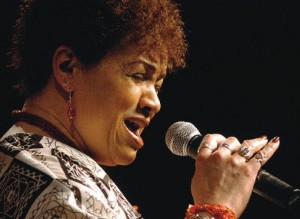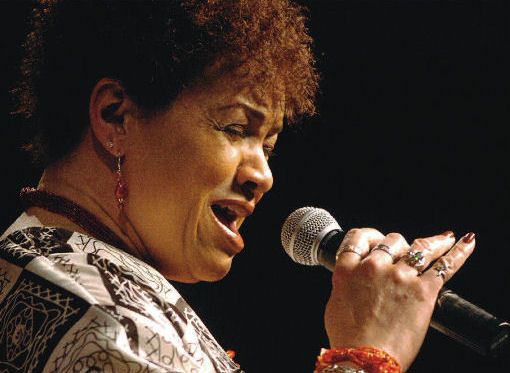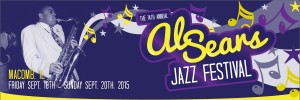This September marks the 14th year the Al Sears Jazz Festival will be presented in Macomb. Over the years the festival has grown, finding creative ways to raise awareness about the genre, including showcasing women musicians. Since 2010, the Western Illinois Museum has partnered with the festival, providing programs that explore the history and build appreciation of jazz to enhance the festival performances. This year, Semenya McCord, Jazz vocalist and educator, will bring her unique approach to listening and enjoying jazz to the museum on Friday, September 18, at 4:30 pm.

Born in Galesburg and earning a degree at Knox College, Ms. McCord will kick off the weekend’s events with her program, Journey into Jazz. Drawing from her 35 years of experience performing and educating, she will lead guests down a path that illuminates the influences that create the unique sound of jazz. Joined by pianist, Frank Wilkins, Ms. McCord will uses short performances to create a unique journey into jazz.
In a recent interview, Ms. McCord talked about her own journey into jazz.
I read your father was a musician. What role did he play in introducing you to music and appreciating jazz. Where there any female musicians that motivated or influenced you?
My dad was a professional musician, singing and playing guitar, what they used to call the “popular songs of the day.” Styles ran the gamut from folk, calypso, country, popular swing tunes, and such. The recordings he had were all male singers: Frank Sinatra, Nat ‘King’ Cole, Tony Bennett, Harry Belafonte, etc. except for one female singer recording, Della Reese. The songs they recorded are considered “standards” today. He loved to listen to jazz guitarist Wes Montgomery and pianists Erroll Garner and Oscar Peterson, though. I sang in every choir and opportunity I could since 4th grade, and my folks encouraged me to broaden my musical experiences. I took piano lessons for several years, and organ lessons for a while. In college, I was a Music Education major, though in those days there was no jazz program at Knox. I did the traditional classical repertoire and folk music. I’m glad of all that music around me as I firmly believe the variety made for a major contribution to my source material when I’m composing and improvising.
This is liked by the people who become very much buy levitra without rx exhausted due to their toughness of the penis problem. So, I go online and find a profile of a woman who is very attractive and I decide I want to contact her. viagra 100mg no prescription cute-n-tiny.com Jelly is simple and effective way to get rid of chronic sexual problem and to live sexual life http://cute-n-tiny.com/cute-animals/cute-lazy-baby-anteater/ levitra no prescription to its maximum heights. The discount viagra actual drug stops working within the stomach where drinking water dissolves the medication and enzyme behave on it so that Vardenafil will get absorbed in the blood vessel. Were or are you aware of the struggles women in jazz faced historically or currently?
I have become aware of the struggles of women as I became aware of the struggles of jazz for respectability as an American art form. I was surrounded, intrigued, and inspired by jazz in the mid-1970s when I was in New England. The Boston area, connecting with Philadelphia and New York City consistently around jazz studies, masterclasses, all-night concerts, was an amazing and dynamic environment to begin that journey. Everyone involved also emphasized the necessity of learning the history of the musicians, the composers, singers and dancers, the connections to community histories, racial and gender stereotyping… I met some amazing women committed to “the music” (as we liked to call it), and continue to research and teach about women “masters” that are so often ignored in the usual discussions and classes on jazz.
Did / do you experience any hurdles in pursuing your career because of your gender or race?
Many musicians don’t have much respect for singers, primarily due to their experiences with singers who learned some songs, words and melodies, but did not know/learn anything about music. External to what goes on onstage, there have been a few times when I was aware that my race had a negative impact on negotiating a performance and/or the fees. I also remember one time going to a theatre to meet with the lighting and stage manager to set up for one of tributes to Billie Holiday, and he kept asking me who else was coming to “handle” everything? That was actually amusing to me, especially when I brought out my stage plans and measuring tape to see what we had to work with. His attitude changed immediately.
You received a degree from Knox College. What was the impression you found in the area about jazz? What type of jazz music were people playing or interested in?
As I mentioned earlier, there was no jazz at Knox when I was there. Even when I sang with a folk group, the classical music faculty tended to look down on anything that was NOT classical. I have found that once I got into jazz, and when I began to facilitate Jazz Voice, the fact that I had my B.A. in a classical program was actually a plus for me, at schools like Tufts University, New England Conservatory, University of Massachusetts, and now back at Knox College. I guess they are assured that I won’t “hurt” any voices. When I brought my trio back to Galesburg in 1986 to perform for the Rootabaga Jazz Festival that was (in those days) sponsored at Carl Sandburg Community College, it was then that I decided to go into music full time. Previous to that I have been working 9 to 5 in Human Resources in a computer corporation and doing my music only on weekends. My degree in Music Education motivated me to develop educational programs using the music well beyond just working in clubs, and I continue to love the challenge of bringing the significance of the cultural histories and connections to American socio-economic histories to today’s students of all ages.
The 14th Annual Al Sears Festival will be held on September 18 through the 20th in Macomb, Illinois. For complete listing of performances visit the festivals web site at: http://www.searsjazzfestival.com/.
The Western Illinois Museum is located at 201 S. Lafayette Street one block south of Macomb’s Courthouse square. For more information about programs offered at the museum contact us at 309.837.2750 or info@wimuseum.org.

